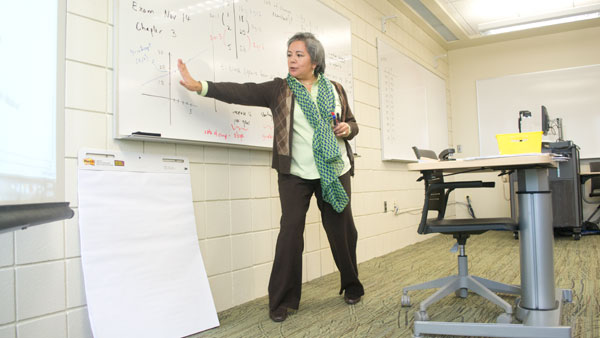As registration for the spring semester approaches next week, first-year students may now consider new courses, such as “The Spoken Word Revolution” and “Numbers in Education,” specifically designed for their respective themes within the Integrative Core Curriculum.
The freshman class is the first wave of students who must fulfill degree requirements within their theme designation for the ICC. The goals of the new general education program are to design students’ curricula in a way that addresses major issues — the themes — from multiple perspectives to become integrative thinkers and problem solvers, Danette Johnson, director of the ICC, said.
“I would certainly imagine that there will be new courses every semester for the foreseeable future,” Johnson said. “New faculty continuously come to IC with differing backgrounds and interests, so they will likely want to develop some new courses.”
This week, Ithaca College professors spoke about their courses in relation to the six themes: Identities; Inquiry, Imagination and Innovation; Power and Justice; Mind, Body, Spirit; The Quest for a Sustainable Future; and a World of Systems. Some professors have constructed new courses, and others have altered existing courses to fit the requirements of the ICC.
The courses are also likely to see a different audience than would be expected because the ICC requirements cannot overlap with major requirements. For example, Mary Beth O’Connor, assistant professor of writing, said she expects her new course, “The Spoken Word Revolution: Poetry for Performance,” will attract a wide reach of students.
O’Connor’s course fulfills requirements for students whose designation is Inquiry, Imagination and Innovation. Previously an Honors seminar titled “Slam it: Spoken Word and the Oral Tradition,” the newly designated ICC course will be taken at a slower pace to spend more time on the innovative spoken word revolution itself, she said. The revamped course will also place a greater emphasis on the creative arts perspective, wherein students will write and perform original spoken word poetry.
“It’s a great medium for expressing what’s really important to people — identity issues, political concerns,” she said. “This is, by its very nature, geared toward that.”
In discussing his course “Environmental Ethics,” Frederik Kaufman, professor of philosophy and religion, said his class focuses on the environment as a vehicle for thinking about the lives people want to lead.
“So many of the environmental problems are not so much in the environment but in our heads,” he said.
Kaufman said his course challenges the technological approach to sustainability, which views the natural world in terms of resources, by looking at people themselves and determining what should change within society. In that sense, according to its theme of The Quest for a Sustainable Future, striving toward sustainability should benefit future generations, he said.
Generations throughout history have also experienced the ups and downs of the economy, which students can explore in “Boom, Bust and the American Economic Cycle,” a World of Systems course taught by Alka Bramhandkar, professor of finance and international business, this spring.
Beyond the economic cycle, Bramhandkar said she will incorporate business decisions as well as social science perspectives and stock market crashes from a global stance. Cascades that lead to economic shut-downs can be created from any corner of the world, she said.
“What has happened in the last five years is that a lack of understanding of all this has brought so many economic systems to their knees,” she said. “Every employee can contribute in a positive or negative manner … to the financial services industry.”
Another new ICC course — also brand new to the college — combines cognition, experimental psychology and neuroscience, which Brandy Bessette-Symons, assistant professor of psychology, said has not been done before in one course at the college.
“Matters of the Mind: The Neuron and Beyond” falls under the Mind, Body, Spirit theme in a way that does not separate the mind, body and spirit, she said.
For example, Bessette-Symons said sometimes amputee patients experience artificial pain in the nonexistent limb because a section of the brain remains neurologically connected to it. Students will study “phantom limb therapy,” which uses mirrors to trick the mind into letting go of this nonexistent pain, she said.
Students registered for both the Power and Justice and Identities themes can take “Reading Buildings” with Lauren O’Connell, professor of art history. This is a brand new course that serves as an introduction to architecture for non-specialists.
Because architecture requires economic and human capital, it has been used throughout history as a tool of authority for people in power, O’Connell said. At the same time, she said the expression of cultural identities through buildings is intertwined with Power and Justice. Both are more advanced topics not typically addressed in introductory-level courses, she said.
“The structure of the ICC is encouraging us to try to introduce some of those higher level and more intriguing concepts right at the ground floor of a student’s studies,” she said.
Johnson said there are 20 new courses offered next spring under the ICC requirements, and an additional eight ran this fall and will run again in the spring.
The Integrative Core Curriculum, which functions to connect all of these thematic pieces, features these new course offerings made available on the college’s website.








